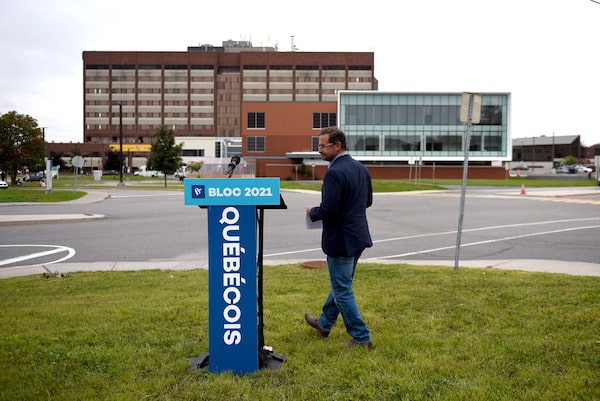
Bloc Quebecois Leader Yves-Francois Blanchet arrives to speak at a campaign event outside the Gatineau Hospital in Gatineau, Que., on Aug. 19.Justin Tang/The Canadian Press
Party leaders battled on the campaign trail over the right prescription to help the country’s health-care systems and how much more funding provinces need to meet needs during and after the pandemic.
This year’s federal budget, released in April, forecast $43.1 billion in health-care transfers to provinces, a drop from the $45.9 billion last fiscal year after extra cash flowed to bolster systems besieged by COVID-19 cases.
At current rates, health transfers are scheduled to rise to $51.7 billion by 2026 under the five-year plan in the budget, a three per cent annual growth rate that premiers have unanimously agreed is not enough to keep up with costs.
Conservative Leader Erin O’Toole said he would boost federal funding for provincially run health-care systems by six per cent annually.
Speaking in French at a stop in Ottawa, O’Toole left the door open to offering more money if the national economy grows faster than expected, which would give federal coffers extra cash to potentially splash around.
Bloc Quebecois Leader Yves-Francois Blanchet, speaking shortly after O’Toole on Thursday morning, said the Conservative plan falls well short of what provinces need.
Blanchet said the COVID-19 pandemic has revealed the ills from years of federal funding falling behind rising costs, and warned the gap will only continue to rise as the population ages with the oldest baby boomers turning 75 this year.
His party, which is only running candidates in Quebec, is telling premiers that the Bloc backs provincial calls for a far greater jump in federal health-care spending, and warned Quebec voters that neither O’Toole nor Trudeau could be trusted.
“Quebec has made seven demands before last election. Not one, not a single one of the seven demands of Quebec has been met. Not one,” he said at an event near the Gatineau hospital, across the river from Ottawa.
The country’s premiers have demanded about $28 billion more this year and $4 billion annually thereafter in health-care funding from the federal government, arguing the current plan of three per cent jumps in spending means transfers don’t keep pace with yearly cost increases of about five per cent.
Liberal Leader Justin Trudeau has said his government wouldn’t talk about changes in spending plans until after the pandemic passes.
Speaking in Victoria, B.C., where he outlined plans to improve wages and conditions in long-term care facilities, Trudeau said the country needs to invest more in health care and that his government would be there to increase provincial transfers, although he did not detail when and by how much.
“How we do that, what kind of objectives we’re looking for, how we ensure that Canadians get the best quality of care is at the heart of the discussions that we need to have with those provinces,” he said.
But he, like other party leaders, focused attacks on O’Toole and a Conservative plank to defend the right for nurses and doctors to object to taking part in certain procedures, such as a medically assisted death or abortion.
O’Toole fended off questions about the proposal by noting he is “pro-choice,” but Trudeau, NDP Leader Jagmeet Singh and Blanchet argued the Conservative platform commitment signalled the opposite.
Singh took aim at Trudeau over the Liberal government’s track record on health-care spending during a campaign stop in Edmonton where Singh highlighted his party’s pledge for a $250 million fund to help train and hire 2,000 nurses.
The NDP leader said the Liberals lambasted the previous Conservative government for cutting funding to provinces in 2014, only to turn around and keep funding increases at that level once in office.
Singh backed the call from premiers to increase health-care spending, and promised to work with provinces if elected to govern.
“The only way we can make sure people have the care they need is if we invest in our publicly funded health-care system with the appropriate funds to make sure it’s there for people when they need it,” Singh said.
This content appears as provided to The Globe by the originating wire service. It has not been edited by Globe staff.